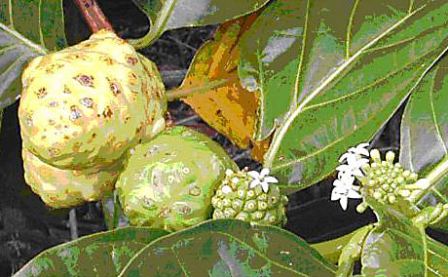Noni Fruit

If you are thinking about planting a noni fruit tree you might want to take a rain check if you find certain odors offensive. The fruit is fondly referred to as cheese fruit and sometimes vomit fruit. Does that make you think twice?
The reference to it as the starvation fruit essentially means that if you are starving and there is nothing to eat then eat noni. Only those suffering famine are likely to accept the strong smell and bitter taste.
Noni juice was touted in the 1990s as an anticancer agent although most claims were based on undocumented reports. However it does appear that some properties are present in the fruit that may fight cancer and other diseases.
Vitamins, Minerals and Phytochemical Components
Noni provides carbohydrates, ascorbic acids, proteins, fructose, glucose, potassium, calcium, sodium, phosphorous, iron and magnesium, dietary fiber, and is low in fat.
Noni fruit contains the following phytochemicals: oligo- and polysaccharides; glycosides (including flavonoids: rutin and asperulosidic); noniosides (this is the chemical to blame for its nasty smell); scopoletin (antibiotic activities); beta-sitosterol (possible anti-cholesterol activity); damnacanthal (potentially an inhibitor of HIV viral proteins); alkaloids (blame this one for the foul taste).
It also contains essential alkaloids including proxeronine that initiates the release of xeronine in the intestine. This basically gets the nutrients into your cells thus improving your bodies ability to use the nutrients appropriately.
Medicinal Uses Based on Scientific Studies
Coming Soon
Return from Noni Fruit to Exotic Fruit List



